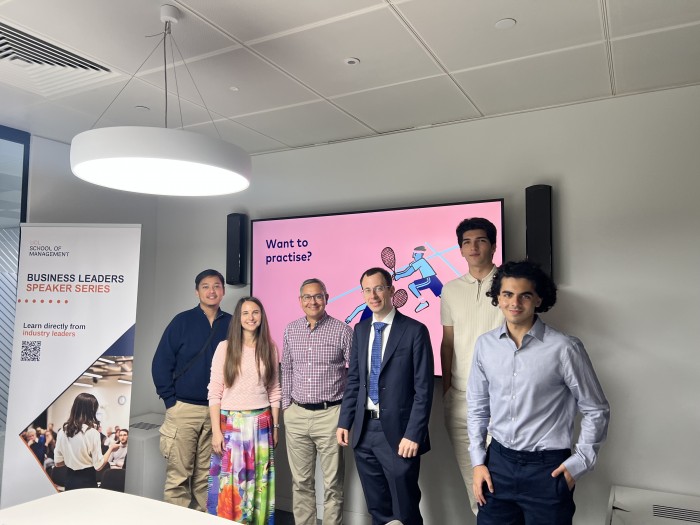
On Tuesday 24 June 2025, UCL School of Management welcomed conversational expert Farley Thomas, Co-Founder of Manageable, to the Business Leaders Speaker Series, an initiative designed to bring together the UCL community, both past and present, to learn and gain advice from industry leaders.
Founded in 2020 by Farley and his wife, Inkin, Manageable was established to address a critical gap in leadership development. Farley, who serves as CEO, COO, and Executive Coach, is driven by his passion to create meaningful change in the corporate landscape by fostering growth, innovation, and transformative leadership within organisations.
The session began with Farley highlighting a key challenge faced by workplaces worldwide: employee engagement. He explained that employees typically fall into three categories:
- Very engaged: those who are passionate, proactive, and willing to go above and beyond in their role.
- Less engaged: employees who have mixed feelings about their work, and are often long-term employees who receive less attention from their managers
- Actively disengaged: employees who are a flight risk and meet only their day to day responsibilities.
Farley shared compelling statistics to illustrate the scope of this issue. Currently, 79% of employees worldwide are considered as being not very engaged, and the main reason, according to Farley, stems from management. Research from Gallup reveals that at least 70% of the differences in engagement between teams are down to the manager.
Additionally, Lenny’s Newsletter, the first large-scale tech worker survey published in May 2025, confirms the correlation of employees’ engagement levels being far greater if paired with great managers. These insights led to Manageable developing the ‘CLICK’ System, a straightforward yet powerful framework designed to foster intentional conversations between leaders and employees.
The goal of the system is to build bridges between employers and employees, to boost engagement levels, enhance workplace culture, and drive organisational success.
Connection
Farley addressed that there are three crucial ways to build meaningful connections within the workplace, drawing on well-known psychological phenomena: the Halo Effect, the Ben Franklin Effect, and Collection Challenges. The Halo Effect suggests that if an individual shares a similar trait or characteristic with another person, such as having the same name or having lived in the same city, they are more likely to perceive them positively and build a trustworthy connection. The Ben Franklin Effect differs slightly, as it explores the theory that performing favours for others can lead to a stronger relationship. Lastly, the Collective Challenges argues that those who work collaboratively to achieve a common goal will result in a positive bond. By understanding and applying these principles, Farley suggests leaders can cultivate stronger and more authentic relationships within their teams, ultimately boosting engagement and collaboration.
Landscape
Farley also emphasised the importance of addressing common communication pitfalls, such as offering unsolicited advice and making assumptions about which methods are effective when solving problems. These issues can hinder genuine understanding and trust. To combat this, Farley expressed the importance of landscape, as it provides the basis for intentional exploratory questions, which will result in the other party feeling heard. Farley suggests the following structure:
- What have you done already?
- How can I help?
- What do you really want?
- What is the real challenge for you here?
- And what else?
- What’s on your mind?
By asking these questions, you will be providing the person with a service that will help resolve their issue, but also it will help you gain their trust.
Insight
To effectively help others generate insight, Farley recommends examining the issue from different points in time, viewing it from multiple perspectives, and trying role reversal. This essentially involves advising someone else facing the same challenge. Additionally, invoking latent or new powers and strengths can facilitate the discovery of hidden potential and solutions.
Challenge
To foster growth among employees, Farley suggests offering constructive challenges that encourage thinking outside the box and embracing the possibility of being wrong. For him, it’s important to recognise that there might be alternative approaches. Overcoming the ‘end of history’ mindset involves seeing beyond current methodologies in the workplace. Lastly, to test your commitment, consider what hurdles you may encounter in achieving your goals and plan how to overcome them.
Key points
To avoid cognitive overload and to ensure key information is absorbed, Farley highlights the importance of ending meetings with key points. By summarising the key points, employees leave feeling engaged and connected with the discussion.
In summary, both Farley’s insights and the ‘CLICK’ framework offer practical strategies for fostering meaningful connections, enhancing communication, and inspiring growth within organisations. By applying these principles - building trust through intentional conversations, addressing communication pitfalls, and encouraging innovative thinking - leaders and employees alike can create a more engaged, collaborative, and transformative workplace. Farley’s approach underscores the importance of deliberate effort and empathy in driving impactful change.
We look forward to welcoming more industry leaders and inspiring discussions in future events. Join us in the new academic year for our upcoming sessions in the Business Leaders Speaker Series, the New Technologies & Innovation Speaker Series, and the UCL Experts & Thought Leaders Speaker Series.